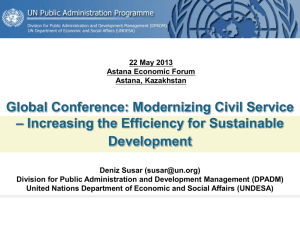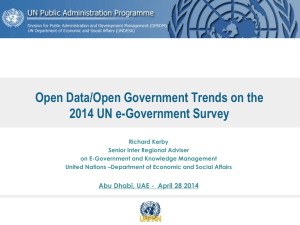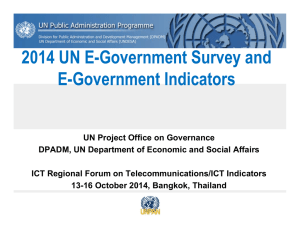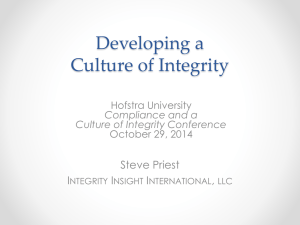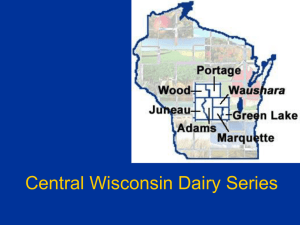DPADM/UNDESA PowerPoint Presentation
advertisement
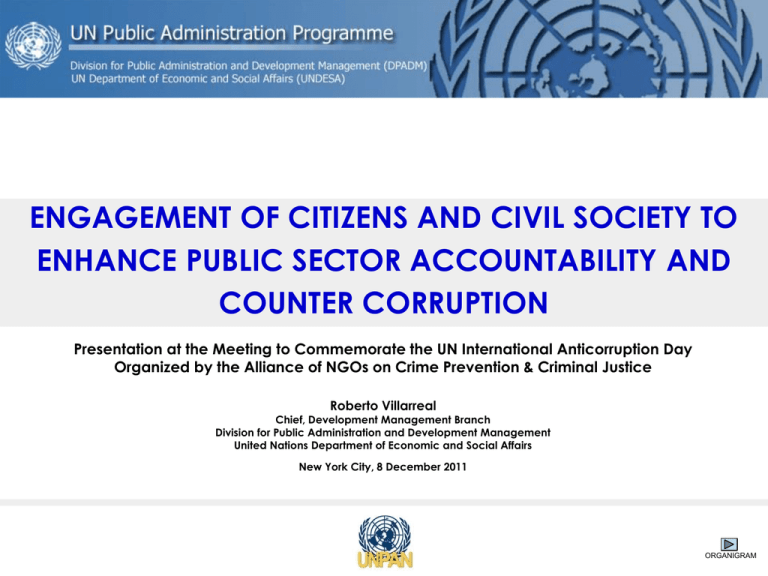
ENGAGEMENT OF CITIZENS AND CIVIL SOCIETY TO ENHANCE PUBLIC SECTOR ACCOUNTABILITY AND COUNTER CORRUPTION Presentation at the Meeting to Commemorate the UN International Anticorruption Day Organized by the Alliance of NGOs on Crime Prevention & Criminal Justice Roberto Villarreal Chief, Development Management Branch Division for Public Administration and Development Management United Nations Department of Economic and Social Affairs New York City, 8 December 2011 ORGANIGRAM UN GENERAL ASSEMBLY RESOLUTION A/RES/65/1: KEEPING THE PROMISE: UNITED TO ACHIEVE THE MDGs “We take note of the lessons learned and successful policies and approaches in the implementation and achievement of the Millennium Development Goals and recognize that with increased political commitment these could be replicated and scaled up for accelerating progress, including by: (…) (e) Supporting participatory, community-led strategies aligned with national development priorities and strategies; (f) Promoting universal access to public and social services and providing social protection floors; (g) Improving capacity to deliver quality services equitably; (h) Implementing social policies and programmes, including appropriate conditional cash-transfer programmes, and investing in basic services for health, education, water and sanitation; (i) Ensuring the full participation of all segments of society, including the poor and disadvantaged, in decision-making processes; (…) (l) Enhancing opportunities for women and girls and advancing the economic, legal and political empowerment of women; (n) Working towards transparent and accountable systems of governance at the national and international levels; GA MILENNIUM DECLARATION AND MDGs PUBLIC GOVERNANCE CITIZENS GROUPS SOCIAL NETWORKS CIVIC ASSOCIATIONS TAXES AND PERSONAL DUTIES PUBLIC GOODS POLITICAL PARTIES PEOPLE LABOR UNIONS UNIVERSITIES AND THINK TANKS COOPERATIVES PROFESSIONAL ASSOCIATIONS INDUSTRAL CHAMBERS MULTISTAKEHOLDERS ORGANIZATIONS (1) STAKEHOLDERS http://www.UNPAN.org/DPADM/ SUPREME AUDITING COMMUNITIES CIVIL SOCIETY ORGANIZATIONS MEDIA JUICIARY (RULE OF LAW, JUSTICE ADMINISTRATION, SECURITY, DEFENSE, PUBLIC HEALTH, SUSTAINABLE ENVIRONMENT, MONETARY AND TECHNICAL STANDARDS, FINANCIAL STABILITY….) PUBLIC SERVICES (CORE PUBLIC ADMINISTRATION SERVICES, INFRASTRUCTURE SERVICES, SOCIAL SERVICES) CONGRESS EXECUTIVE, ADMINISTRATION GOVERNMENT CENTRAL BANK MINISTRIES CONSUMER PROTECTION SOE ANTICORRUPTION AGENCY HUMAN RIGHTS OMBUDSMAN ESC LEADERSHIP, LEGAL FRAMEWORK, EMPOWREMENT OF CITIZENS, ACCESS TO INFORMATION, TRANSPARENCY, (2) SUBSTANTIVE MATTER ICT(3) INSTITUTIONS (4) ENABLING CONDITIONS 3 ACCOUNTABILITY : DIVERSE MODES LOCAL LEVEL PROVINCIAL OR STATE LEVEL COUNTRY LEVEL PRIVATE SECTOR AND SOCIETY GOVERNMENT, PUBLIC SECTOR TOP TOP S1 SN S2 I A I A DEMOCRATIC ACCOUNTABILITY HIERACHICAL ACCOUNTABILITY http://www.UNPAN.org/DPADM/ CITIZENS AND CIVIL SOCIETY ORGANIZATIONS LEGISLATURE EXECUTIVE E1 AUD I A U En I A S INTERNAL AUDITING OFFICIAL AUDITING L S R AUD R SUPREME AUDITING DIRECT ACCOUNTABILITY TO CITIZENS 4 A TASK-FOCUSED COMPARATIVE ADVANTAGE MINDED VIEW ON THE IMPROVEMENT OF PUBLIC SERVICES (FOR DISCUSSION) … http://www.UNPAN.org/DPADM/ HAVE NOTs FRMAL INSTRUMENTS (EXAMPLES) • Investigations • Auditing • Inspections • Multi-stakeholderBoards • Civic observatories and councils • Ombusdmen INFORMAL • Illegitimate control (tolerance or protection of wrong or criminal acts or conducts, even if no tangible economic dimensions are in the forefront), e.g., incompetence, malpractice, unethical behavior, low respect for clients, etc.) HAVEs • Illegitimate taxation (bribes) … TRADITIONAL GOVERNMENT ORGANS, HIGH-LEVEL CSOs • Illegitimate acquisitions and spending and illegitimate (non-) collection of deliveries (deviations in expenditures and collections of service fees) USERS, CITIZENS, GRASSROOTS CSOs • Illegitimate exclusion of non-State producers (deviations in granting exclusive production rights: concessions, permits, licenses, etc, .) ALL USERS AND CITIZENS ANTI-CORRUPTION: PREVENTION OR ERADICATION OF: TO COMPARATIVE ADVANTAGE WHOM (HYPOTHESIS: SPATIAL, SKILLS, (?) ORGANIZATIONAL CULTURE) •Reporting systems • Hearings, meetings HOW DO FORMAL AND INFORMAL NEED FOR MORE EFFECTIVE POLICIES? INSTITUTIONS WORK TOGETHER? 5 FOR DELIBERATION AND ANALYSIS http://www.UNPAN.org/DPADM/ TRADITIONAL GOVERNMENT ORGANS, HIGH-LEVEL CSOs USERS, CITIZENS, GRASSROOTS CSOs COMPARATIVE ADVANTAGE (HYPOTHESIS: SPATIAL, SKILLS, ORGANIZATIONAL CULTURE) Do these comparative advantages exist? Are both approaches complementary to each other? Are there undesirable duplications of functions or other negative effects? Can an effective and efficient combination of the two approaches be attained, and in case, how? 6 FINAL REMARKS The Development Management Branch (DMB) looks forward to conclude by the end of 2011 a publication covering issues of interest for all UN Member States on “Accountability and Eradication of Corruption for Fostering Development : Engagement of Citizens.” Different activities will be pursued in this regard: – Analytical and research efforts • Concepts • Indicators – A number of international meetings with experts and practitioners • For knowledge sharing and capacity building – A global knowledge base on auditing and accountability and eradication of corruption for development will be constructed, as part of the UN Public Administration Country Studies database (UNPACS) • To systematically gather, organize and publicly offer information on every UN Member State on their legal and institutional framework, and on good practices – Laws, institutions, organization models » Institutions for citizens engagement It is expected that these efforts will effectively contribute to the intergovernmental process of the United Nations • Declarations, resolutions, guidelines All participants are welcome to cooperate with DMB in these matters 7 FINAL REMARKS The Division for Public Administration and Development Management, functions as Secretariat to the United Nations Public Service Awards – In 2011, in cooperation with the United Nations Office on Drugs and Crime, a new category was inaugurated on prevention of corruption – For most information see: www.unpan.org END OF PRESENTATION 8 ANNEXES http://www.UNPAN.org/DPADM/ 9 DPADM AND DMB IN THE UN SECRETARIAT UNITED NATIONS GOVERNING BODIES BACK General Assembly, Economic and Social Council, etc. DESA DIVISION FOR PUBLIC ADMINISTRATION AND DEVELOPMENT MANAGEMENT (DPADM) UNITED NATIONS SECRETARIAT Office of the Secretary General and executive offices DEPARTMENT OF ECONOMIC AND SOCIAL AFFAIRS (DESA) OTHER DEPARTMENTS AND OFFICES; REGIONAL COMMISSIONS SPECIALIZED AGENCIES, AND PROGRAMS (UNESCO, UNCTAD, WHO, FAO, UNICEF, UNDP, etc.) DEVELOPMENT MANAGEMENT BRANCH Economics, Social, Environment, Gender, etc. e-GOVERNMENT BRANCH (eGB) (DMB) Internet Governance Forum (IGF) OTHER DIVISIONS AND OFFICES PUBLIC ADMINISTRATION CAPACITY DEVELOPMENT BRANCH (PACB) UN Programme on Governance (UNPOG) Global Alliance for ICT and Development (GAID) Global Centre for eParliament MILLENNIUM DECLARATION • Development encompasses a considerable large array of matters, so to focus attention and concentrate efforts from relevant actors in a set of very fundamental ones, the Millennium Declaration adopted by the UN General Assembly in 2000, highlighted the following and set corresponding targets for the year 2015 to guide adequate progress (continued…) MILLENIUM DEVELOPMENT GOALS AND TARGETS (1) Goal 1 End Poverty and Hunger • • • Target 1: Halve, between 1990 and 2015, the proportion of people whose income is less than $1 a day Target 2: Achieve full and productive employment and decent work for all, including women and young people Target 3: Halve, between 1990 and 2015, the proportion of people who suffer from hunger Goal 2 Achieve Universal Primary Education • Target 1: Ensure that, by 2015, children everywhere, boys and girls alike, will be able to complete a full course of primary schooling Goal 3 Promote Gender Equality and Empower Women • Target 1: Eliminate gender disparity in primary and secondary education, preferably by 2005, and in all levels of education no later than 2015 MILLENIUM DEVELOPMENT GOALS AND TARGETS (2) Goal 4 Reduce Child Mortality • Target 1: Reduce by two thirds, between 1990 and 2015, the underfive mortality rate Goal 5 Improve maternal Health • • Target 1: Reduce by three quarters the maternal mortality ratio Target 2: Achieve universal access to reproductive health Goal 6 Combat HIV/AIDS, Malaria and Other Diseases • • • Target 1: Have halted by 2015 and begun to reverse the spread of HIV/AIDS Target 2: Achieve, by 2010, universal access to treatment for HIV/AIDS for all those who need it Target 3: Have halted by 2015 and begun to reverse the incidence of malaria and other major diseases MILLENIUM DEVELOPMENT GOALS AND TARGETS (3) Goal 7 Ensure Environmental Sustainability • Target 1: Integrate the principles of sustainable development into country policies and programmes and reverse the loss of environmental resources • Target 2: Reduce biodiversity loss, achieving, by 2010, a significant reduction in the rate of loss • Target 3: Halve, by 2015, the proportion of the population without sustainable access to safe drinking water and basic sanitation • Target 4: By 2020, to have achieved a significant improvement in the lives of at least 100 million slum dwellers MILLENIUM DEVELOPMENT GOALS AND TARGETS (4) Goal 8 Develop a Global Partnership for Development • Target 1: Address the special needs of least developed countries, landlocked countries and small island developing states • Target 2: Develop further an open, rule-based, predictable, nondiscriminatory trading and financial system • Target 3: Deal comprehensively with developing countries’ debt • Target 4: In cooperation with pharmaceutical companies, provide access to affordable essential drugs in developing countries • Target 5: In cooperation with the private sector, make available benefits of new technologies, especially information and communications GO BACK END OF ANNEXES http://www.UNPAN.org/DPADM/ 16
